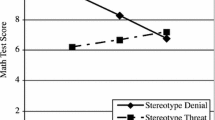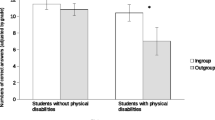Abstract
This study examines the relationship between stereotype threat and individual test-taking behaviors. Previous research has examined the impact of stereotype threat on test scores, but little research has examined the impact of stereotype threat on the test-taking behaviors impacting those scores. Using a pre-post experimental design, stereotype threat was manipulated and test-taking behaviors (e.g., time spent per item, response changes) were measured while completing verbal ability items before and after the manipulation. The results indicated that stereotype threat minimally impacted time-related test-taking behaviors, but did impact behaviors related to response changes. Implications of the findings are discussed.
Similar content being viewed by others
References
Aronson J., Fried C., Good C. (2002) Reducing the effects of stereotype threat on African American college students by shaping theories of intelligence. Journal of Experimental Social Psychology 38: 29–46
Aronson J., Lustina M. J., Good C., Keough K., Steele C. M., Brown J. (1999) Whenwhite men can’t do math: Necessary and sufficient factors in stereotype threat. Journal of Experimental Social Psychology 35: 29–46
Benjamin L. T., Cavell T. A., Shallenberger W. R. (1984) Staying with initial answers onobjective tests: Is it a myth. Teaching of Psychology 11: 133–141
Bridgeman B., Trapani C., Curley E. (2004) Impact of fewer questions per section on SAT I scores. Journal of Educational Measurement 41: 291–310
Brown R. P., Pinel E. C. (2003) Stigma on my mind: Individual differences in the experience of stereotype threat. Journal of Experimental Social Psychology 39: 626–633
Burns K. C., Isbell L. M. (2007) Promoting malleability is not one size fits all: Primingimplicit theories of intelligence as a function of self-theories. Self & Identity 6: 51–63
Croizet J., Claire T. (1998) Extending the concept of stereotype and threat to social class: The intellectual underperformance of students from low socioeconomic backgrounds. Personality & Social Psychology Bulletin 24: 588–594
Di Milia L. (2007) Benefiting from multiple-choice exams: The positive impact of answerswitching. Educational Psychology 27: 607–615
Ellis A.P.J., Ryan A.M. (2003) Race and cognitive-ability test performance: The mediating effects of test preparation, test-taking strategy use, and self-efficacy. Journal of Applied Social Psychology 33: 2607–2629
Eysenck M. W., Derakshan N., Santos R., Calvo M. G. (2007) Anxiety and cognitiveperformance: Attentional control theory. Emotions 7: 336–353
Geen R. G. (1985) Test anxiety and visual vigilance. Journal of Personality and Social Psychology 49: 963–970
Geiger M. A. (1991) Changing multiple-choice answers: Do students accurately perceive theirperformance?. Journal of Experimental Education 59: 250–257
Heubert, J. P., Hauser, R. M. (eds) (1999) High stakes: Testing for tracking, promotion, andgraduation. National Academy Press, Washington, DC
Hough L. M., Oswald F. L., Ployhart R. E. (2001) Determinants, detection and ameliorationadverse impact in personnel selection procedures: Issues, evidence, and lessons learned. International Journal of Selection and Assessment 9: 152–194
Keller J. (2007) Stereotype threat in classroom settings: The interactive effect of domainidentification task difficulty and stereotype threat on female students’ math performance. British Journal of Educational Psychology 77: 323–338
Kruger J., Wirtz D., Miller D. T. (2005) Counterfactual thinking and the first instinctfallacy. Journal of Personality and Social Psychology 88: 725–735
Mandinach, E. B., Bridgeman, B., Cahalan-Laitusis, C., & Trapani, C. (2005). The impact ofextended time on SAT test performance (ETS Research Report). Princeton, NJ: Educational Testing Services.
Maner J. K., Richey J. A., Cromer K., Mallott M., Lejuez C. W., Joiner T. E., Schmidt N. B. (2007) Dispositional anxiety and risk-avoidant decision-making. Personality andIndividual Differences 42: 666–675
McNulty J., Sonntag B., Sinacore J. (2007) Test-taking behaviors on a multiple-choiceexam are associated with performance on the exam and with learning style. Journal of the International Association of Medical Science Educators 17: 52–57
Mueller D., Wasser V. (1977) Implications of changing answers on objective test items. Journal of Educational Measurement 14: 9–13
Nguyen H. D., O’Neal A., Ryan A. M. (2003) Relating test-taking attitudes and skillsand stereotype threat effects to the racial gap in cognitive ability test performance. Human Performance 16: 261–294
Nguyen H. D., Ryan A. M. (2008) Does stereotype threat affect test performance of minoritiesand women? A meta-analysis of experimental evidence. Journal of Applied Psychology 93: 1314–1334
Oates G. (2009) An empirical test of five prominent explanations for the black-white academicperformance gap. Social Psychology of Education 12: 415–441
Roth P. L., Bevier C. A., Bobko P., Switzer F. S. I., Tyler P. (2001) Ethnic groupdifferences in cognitive ability in employment and educational settings: A meta-analysis. Personnel Psychology 54: 297–330
Sackett P. R. (2003) Stereotype threat in applied selection settings: A commentary. Human Performance 16: 295–309
Sackett P. R., Hardison C. M., Cullen M. J. (2004) On interpreting stereotype threat asaccounting for African–American–White differences on cognitive tests. American Psychologist 59: 7–13
Sackett P. R., Schmitt N., Ellingson J. E., Kabin M. B. (2001) High-stakes testing in employment, credentialing, and higher education: Prospects in a post-affirmative-action world. American Psychologist 56: 302–318
Smith C., Hung L. (2008) Stereotype threat: Effects on education. Social Psychology of Education 11: 243–257
Spencer S. J., Steele C. M., Quinn D. M. (1999) Stereotype threat and women’s mathperformance. Journal of Experimental and Social Psychology 35: 29–46
Steele C. M. (1997) A threat in the air: How stereotypes shape intellectual identity andperformance. American Psychologist 52: 613–629
Steele C. M., Aronson J. (1995) Stereotype threat and the intellectual test performance of African Americans. Journal of Personality and Social Psychology 69: 797–811
Steele C. M., Davies P. G. (2003) Stereotype threat and employment testing: A commentary. Human Performance 16: 311–326
Whaley A. L. (1998) Issues of validity in empirical tests of stereotype threat theory. American Psychologist 53: 679–680
Wild C., Durso R., Rubin D. (1982) Effect of increased test-taking time on test scores byethnic group, years out of school, and sex. Journal of Educational Measurement 19: 19–28
Author information
Authors and Affiliations
Corresponding author
Rights and permissions
About this article
Cite this article
Scherbaum, C.A., Blanshetyn, V., Marshall-Wolp, E. et al. Examining the effects of stereotype threat on test-taking behaviors. Soc Psychol Educ 14, 361–375 (2011). https://doi.org/10.1007/s11218-011-9154-2
Received:
Accepted:
Published:
Issue Date:
DOI: https://doi.org/10.1007/s11218-011-9154-2




